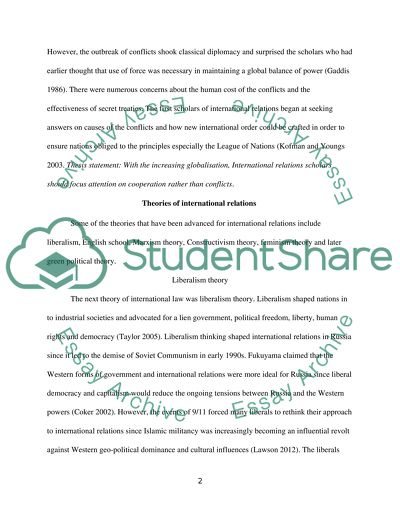Cite this document
(“In 1919 the discipline of International Relations began with a Essay”, n.d.)
In 1919 the discipline of International Relations began with a Essay. Retrieved from https://studentshare.org/history/1621310-in-1919-the-discipline-of-international-relations-began-with-a-question-as-to-why-wars-occur-almost-a-hundred-years-on-and-in-the-increasingly-globalizing-world-should-ir-scholars-still-focus-mainly-on-conflict-or-maybe-cooperation
In 1919 the discipline of International Relations began with a Essay. Retrieved from https://studentshare.org/history/1621310-in-1919-the-discipline-of-international-relations-began-with-a-question-as-to-why-wars-occur-almost-a-hundred-years-on-and-in-the-increasingly-globalizing-world-should-ir-scholars-still-focus-mainly-on-conflict-or-maybe-cooperation
(In 1919 the Discipline of International Relations Began With a Essay)
In 1919 the Discipline of International Relations Began With a Essay. https://studentshare.org/history/1621310-in-1919-the-discipline-of-international-relations-began-with-a-question-as-to-why-wars-occur-almost-a-hundred-years-on-and-in-the-increasingly-globalizing-world-should-ir-scholars-still-focus-mainly-on-conflict-or-maybe-cooperation.
In 1919 the Discipline of International Relations Began With a Essay. https://studentshare.org/history/1621310-in-1919-the-discipline-of-international-relations-began-with-a-question-as-to-why-wars-occur-almost-a-hundred-years-on-and-in-the-increasingly-globalizing-world-should-ir-scholars-still-focus-mainly-on-conflict-or-maybe-cooperation.
“In 1919 the Discipline of International Relations Began With a Essay”, n.d. https://studentshare.org/history/1621310-in-1919-the-discipline-of-international-relations-began-with-a-question-as-to-why-wars-occur-almost-a-hundred-years-on-and-in-the-increasingly-globalizing-world-should-ir-scholars-still-focus-mainly-on-conflict-or-maybe-cooperation.


